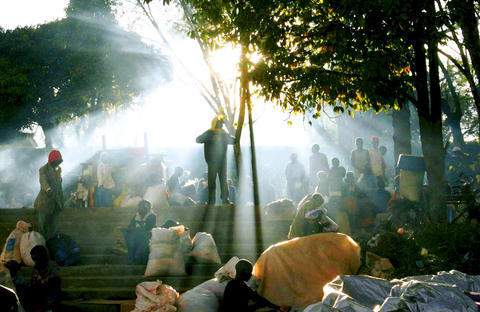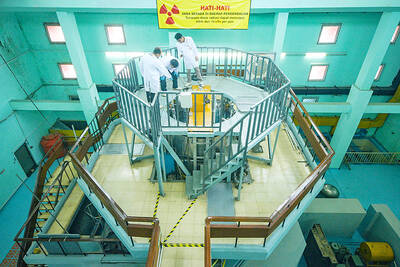Rival Kenyan political parties jostled for support yesterday ahead of a flashpoint re-opening of parliament amid the devastating crisis spurred by the disputed presidential election.
With more than 700 people already killed in the violence that followed the Dec. 27 re-election of President Mwai Kibaki, Kenyans were bracing for more possible violence this week as the opposition plans to go ahead with three days of nationwide demonstrations beginning tomorrow, despite a police ban.
Kibaki is due to open the country's 10th parliament today, setting the stage for the first post-election show of political strength as lawmakers elect one of their own to the powerful post of parliament speaker.

PHOTO: EPA
With none of the major parties having a majority of seats, they have been furiously wooing smaller parties ahead of the vote.
Opposition leader Raila Odinga and his Orange Democratic Movement (ODM), which claims Kibaki stole the presidential election by vote fraud, won the most seats in the parliamentary elections also held on Dec. 27, capturing 99 of the chamber's 222 seats.
Kibaki's Party of National Unity (PNU) won 43 seats and an allied party 16 seats.
The speaker's election requires a two-third majority for the first two rounds, but requires only a simple majority if the vote moves to a third round.
Four candidates have entered the race, with the government side supporting the re-election of veteran speaker Francis ole Kaparo, while the opposition is fronting MP-elect Kenneth Marende.
"We are convinced that we are going to get enough numbers to elect a neutral speaker who will serve the house without favor. We are appealing to all political parties and individual MPs who love peace to support us," said Mutula Kilonzo, a spokesman for the government side.
Both the PNU and its ally, along with the ODM, began holding separate meetings on Sunday to plan for the opening of parliament.
"We are going for a retreat to seek ways that would enable ODM's candidate to win. We have the numbers but we will not take chances," ODM member William Ruto told the Daily Nation newspaper.
Ruto has rejected the widely held view that by attending the opening of parliament, convened by Kibaki, the opposition is in effect recognizing the legitimacy of his presidency.
"We are not going to sit back and allow them install a speaker who will pave the way for the illegitimacy to continue," Ruto said.
Although the session is expected to be stormy, the three days of nationwide demonstrations called by the ODM, expected to start tomorrow, have been banned by the government, as there are fears of more violence.
Nationwide rioting that erupted after the swearing in of Kibaki on Dec. 30 rapidly descended into tribal clashes, leaving at least 700 people dead and displacing nearly 260,000.

Four people jailed in the landmark Hong Kong national security trial of "47 democrats" accused of conspiracy to commit subversion were freed today after more than four years behind bars, the second group to be released in a month. Among those freed was long-time political and LGBTQ activist Jimmy Sham (岑子杰), who also led one of Hong Kong’s largest pro-democracy groups, the Civil Human Rights Front, which disbanded in 2021. "Let me spend some time with my family," Sham said after arriving at his home in the Kowloon district of Jordan. "I don’t know how to plan ahead because, to me, it feels

Poland is set to hold a presidential runoff election today between two candidates offering starkly different visions for the country’s future. The winner would succeed Polish President Andrzej Duda, a conservative who is finishing his second and final term. The outcome would determine whether Poland embraces a nationalist populist trajectory or pivots more fully toward liberal, pro-European policies. An exit poll by Ipsos would be released when polls close today at 9pm local time, with a margin of error of plus or minus 2 percentage points. Final results are expected tomorrow. Whoever wins can be expected to either help or hinder the

North Korea has detained another official over last week’s failed launch of a warship, which damaged the naval destroyer, state media reported yesterday. Pyongyang announced “a serious accident” at Wednesday last week’s launch ceremony, which crushed sections of the bottom of the new destroyer. North Korean leader Kim Jong-un called the mishap a “criminal act caused by absolute carelessness.” Ri Hyong-son, vice department director of the Munitions Industry Department of the Party Central Committee, was summoned and detained on Sunday, the Korean Central News Agency (KCNA) reported. He was “greatly responsible for the occurrence of the serious accident,” it said. Ri is the fourth person

SKEPTICAL: Given the challenges, which include waste disposal and potential domestic opposition, experts warn that the 2032 nuclear timeline is overambitious Indonesia is hoping going nuclear can help it meet soaring energy demand while taming emissions, but faces serious challenges to its goal of a first small modular reactor by 2032. Its first experiment with nuclear energy dates to February 1965, when then-Indonesian president Sukarno inaugurated a test reactor. Sixty years later, Southeast Asia’s largest economy has three research reactors, but no nuclear power plants for electricity. Abundant reserves of polluting coal have so far met the enormous archipelago’s energy needs, but “nuclear will be necessary to constrain the rise of and eventually reduce emissions,” said Philip Andrews-Speed, a senior research fellow at the